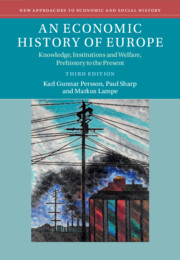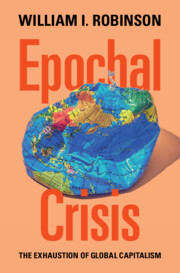Refine search
Actions for selected content:
627 results
Analyzing globalization through a case study of wine: the Global Wine Markets Annual Database, 1835–2023
-
- Journal:
- Revista de Historia Economica - Journal of Iberian and Latin American Economic History , First View
- Published online by Cambridge University Press:
- 09 December 2025, pp. 1-15
-
- Article
-
- You have access
- Open access
- HTML
- Export citation
6 - The Derailment of a Dream: Amartya Sen and the Sisyphean Task of Defending Rights
- from Part III - Legitimizing Human Rights
-
- Book:
- In Defense of Economic and Social Human Rights
- Published online:
- 06 November 2025
- Print publication:
- 20 November 2025, pp 195-227
-
- Chapter
- Export citation
1 - War of Want
-
-
- Book:
- Hunger Redraws the Map
- Published online:
- 01 November 2025
- Print publication:
- 20 November 2025, pp 18-43
-
- Chapter
- Export citation
8 - Next Stages
-
- Book:
- Moral Imagination in the Twenty-first Century
- Published online:
- 30 October 2025
- Print publication:
- 13 November 2025, pp 157-172
-
- Chapter
- Export citation
Globalization, Higher Education, and Neoliberal Values: Evidence from the Bologna Process
-
- Journal:
- British Journal of Political Science / Volume 55 / 2025
- Published online by Cambridge University Press:
- 03 November 2025, e145
-
- Article
-
- You have access
- Open access
- HTML
- Export citation
3 - Modernization and Its Discontents: Climate Change, Sociopolitical Reform, and Demographic Anxiety
- from Part I - The Birth of the Petro-State: How Oil Reshaped the Gulf
-
- Book:
- The Gulf's Climate Reckoning
- Published online:
- 13 October 2025
- Print publication:
- 30 October 2025, pp 72-108
-
- Chapter
- Export citation
3 - Effects of Geopolitical Changes on International Energy Relations
-
- Book:
- China's International Energy Relations
- Published online:
- 10 October 2025
- Print publication:
- 30 October 2025, pp 36-53
-
- Chapter
- Export citation
Chapter 5 - Premodern Globalization?
-
- Book:
- The Roman Empire and World History
- Published online:
- 31 October 2025
- Print publication:
- 30 October 2025, pp 119-152
-
- Chapter
- Export citation

The Archaeology of the Cyclades in the Roman and Late Antique Periods
- Globalization, Christianization and Resilience
-
- Published online:
- 23 October 2025
- Print publication:
- 06 November 2025

An Economic History of Europe
- Knowledge, Institutions and Welfare, Prehistory to the Present
-
- Published online:
- 02 October 2025
- Print publication:
- 02 October 2025
-
- Textbook
- Export citation
9 - Factor Markets and Globalization
-
- Book:
- An Economic History of Europe
- Published online:
- 02 October 2025
- Print publication:
- 02 October 2025, pp 204-229
-
- Chapter
- Export citation
8 - Trade and Globalization
-
- Book:
- An Economic History of Europe
- Published online:
- 02 October 2025
- Print publication:
- 02 October 2025, pp 178-203
-
- Chapter
- Export citation
24 - Children in Social Change
- from Part V - Postcolonial and Political–Economic Interventions
-
-
- Book:
- The Cambridge Handbook of Psychological Anthropology
- Published online:
- 22 October 2025
- Print publication:
- 25 September 2025, pp 581-603
-
- Chapter
- Export citation
22 - The Psychological Anthropology of Mental Health and Psychiatric Treatment
- from Part V - Postcolonial and Political–Economic Interventions
-
-
- Book:
- The Cambridge Handbook of Psychological Anthropology
- Published online:
- 22 October 2025
- Print publication:
- 25 September 2025, pp 531-554
-
- Chapter
- Export citation
Introduction
-
- Book:
- Epochal Crisis
- Published online:
- 21 August 2025
- Print publication:
- 04 September 2025, pp 1-11
-
- Chapter
- Export citation

Epochal Crisis
- The Exhaustion of Global Capitalism
-
- Published online:
- 21 August 2025
- Print publication:
- 04 September 2025
Chapter 2 - What Does the Term “School” Stand For?
-
- Book:
- School Adjustment
- Published online:
- 29 August 2025
- Print publication:
- 07 August 2025, pp 20-35
-
- Chapter
- Export citation
21 - The Psychological Consequences of Globalization and the Rise of Violent Extremism
- from Part IV - Macro-Level Perspectives
-
-
- Book:
- The Cambridge Handbook of the Psychology of Violent Extremism
- Published online:
- 31 October 2025
- Print publication:
- 07 August 2025, pp 426-450
-
- Chapter
- Export citation
Los ingenieros militares y la articulación del Caribe: Agentes locales para una historia global
-
- Journal:
- Latin American Research Review ,
- Published online by Cambridge University Press:
- 25 July 2025, pp. 1-20
-
- Article
-
- You have access
- Open access
- HTML
- Export citation
Conclusion
-
- Book:
- The Law and Politics of International Legitimacy
- Published online:
- 14 July 2025
- Print publication:
- 24 July 2025, pp 488-491
-
- Chapter
- Export citation
